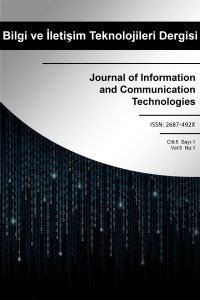ÖĞRETMEN ADAYLARININ TOPLUMSAL CİNSİYET EŞİTLİĞİ ALGISI VE TEKNOLOJİ KULLANIM SEVİYELERİ ARASINDAKİ İLİŞKİ
Öz
Bu araştırmanın amacı öğretmen adaylarının toplumsal cinsiyet eşitliği algısı ve teknoloji kullanım seviyeleri arasındaki ilişkinin bazı değişkenler açısından incelenmesidir. Bu yüzden nicel bir araştırma yöntemi benimsenmiş olup betimsel tarama modeli kullanılmıştır. Verilerin toplanmasında üç ayrı araç kullanılmıştır. Bu araçlardan ilki demografik bilgi formu ikincisi Bilgisayar ve Öğretim Teknolojileri Toplumsal Cinsiyet Eşitliği Algı Ölçeği ve üçüncüsü de Bilgi ve İletişim Teknolojileri Kullanımı Seviyeleri Belirleme Ölçeği’dir. Yapılan bu araştırma 2021-2022 akademik yılı içerisinde Necmettin Erbakan Üniversitesi, Ahmet Keleşoğlu Eğitim Fakültesinde farklı bölümlerde öğrenim gören 288 öğretmen adayına uygulanmıştır. Araştırma verileri bir istatistik programı ile çözümlenmiştir. Yapılan istatistiksel analizler sonucunda çalışma grubunun toplumsal cinsiyet eşitliği algısı durumları cinsiyet değişkenine göre anlamlı bir farklılık gösterdiği gözlemlenmiştir. Bununla birlikte teknoloji kullanım seviyeleri durumları cinsiyet değişkenine göre anlamlı bir farklılık göstermediği gözlemlenmiştir. Çalışma grubunun toplumsal cinsiyet eşitliği algısı durumlarının ağırlıklı not ortalaması değişkenine göre anlamlı bir farklılık gösterdiği gözlemlenmiştir. Aynı zamanda teknoloji kullanım seviyeleri durumlarının ağırlıklı not ortalaması değişkenine yönelik aldıkları puanlar arasında anlamlı bir farklılık gösterdiği gözlemlenmiştir. Çalışma grubunun toplumsal cinsiyet eşitliği algısı durumlarının günlük internet kullanım süresi değişkenine göre anlamlı bir farklılık gösterdiği gözlemlenmiştir. Ek olarak teknoloji kullanım seviyeleri durumlarının günlük internet kullanım süresi değişkenine yönelik aldıkları puanlar arasında anlamlı bir farklılık gösterdiği gözlemlenmiştir. Çalışma grubunun toplumsal cinsiyet eşitliği algısı durumlarının ailelerin eğitim seviyesi değişkenine göre anlamlı bir farklılık göstermediği gözlemlenmiştir. Buna karşılık teknoloji kullanım seviyeleri durumlarının ailelerin eğitim seviyesi değişkenine yönelik aldıkları puanlar arasında anlamlı bir farklılık gösterdiği gözlemlenmiştir. Çalışma grubunun toplumsal cinsiyet eşitliği algısı durumlarının ailenin sosyoekonomik yapısına göre anlamlı bir farklılık göstermediği gözlemlenmiştir. Aynı zamanda teknoloji kullanım seviyeleri durumlarının ailenin sosyoekonomik yapısı değişkenine yönelik aldıkları puanlar arasında anlamlı bir farklılık göstermediği gözlemlenmiştir.
Anahtar Kelimeler
Cinsiyet Toplumsal Cinsiyet Bilgi ve İletişim Teknolojileri Bilgi ve İletişim Teknolojilerinin Kullanımı
Kaynakça
- Karaoglan Yilmaz, F. G., & Keser, H. (2016). The impact of reflective thinking activities in e-learning: A critical review of the empirical research. Computers & Education, 95, 163-173.
- Aikman, S., Unterhalter, E. (2007). Practising gender equality in education. United Kingdom: Oxfam GB.
- Akbulut, U. Y. (2020). Üniversite Öğrencilerinin Toplumsal Cinsiyet Eşitliğine Dair Görüşleri. (Yayınlanmamış Yüksek Lisans Tezi). Ömer Halisdemir Üniversitesi Eğitim Bilimleri Enstitüsü, Niğde.
PERCEPTION OF GENDER EQUALITY OF TEACHER CANDIDATES AND THE RELATIONSHIP BETWEEN TECHNOLOGY USE LEVELS
Öz
The importance of the research obtained is to examine the relationship between pre-service teachers' perception of gender equality and their level of technology use in terms of some variables. A quantitative research method was adopted and a descriptive survey model was used. Three different tools were used to collect the data. The first is the demographic information form, the second is the Computer and Instructional Technologies Gender Equality Perception Scale and the third is the Information and Communication Technologies Usage Level Determination Scale. This research was applied to 288 teacher candidates studying in different departments at Necmettin Erbakan University, Ahmet Keleşoğlu Faculty of Education in the 2021-2022 academic year. Research data were analyzed with a statistical program. As a result of the statistical analyzes, it was observed that the gender equality perception status of the study group showed a significant difference according to the gender variable. However, it was observed that technology use levels did not show a significant difference according to the gender variable. It was observed that the gender equality perception status of the study group showed a significant difference according to the weighted grade point average variable. At the same time, it was observed that there was a significant difference between the scores of technology usage levels and the weighted grade point average variable. It was observed that the gender equality perception status of the study group showed a significant difference according to the variable of daily internet usage time. In addition, it has been observed that there is a significant difference between the levels of technology use and the scores they get for the variable of daily internet usage time. It was observed that the gender equality perception status of the study group did not show a significant difference according to the education level of the families. On the other hand, it was observed that there was a significant difference between the levels of technology use and the scores of the families for the education level variable. It was observed that the gender equality perception status of the study group did not differ significantly according to the socioeconomic structure of the family. At the same time, it was observed that technology use levels did not show a significant difference between the scores they received for the socioeconomic structure of the family variable.
Anahtar Kelimeler
Gender Social Gender İnformation and Communication Technologies Use of İnformation And Communication Technologies
Kaynakça
- Karaoglan Yilmaz, F. G., & Keser, H. (2016). The impact of reflective thinking activities in e-learning: A critical review of the empirical research. Computers & Education, 95, 163-173.
- Aikman, S., Unterhalter, E. (2007). Practising gender equality in education. United Kingdom: Oxfam GB.
- Akbulut, U. Y. (2020). Üniversite Öğrencilerinin Toplumsal Cinsiyet Eşitliğine Dair Görüşleri. (Yayınlanmamış Yüksek Lisans Tezi). Ömer Halisdemir Üniversitesi Eğitim Bilimleri Enstitüsü, Niğde.
Ayrıntılar
| Birincil Dil | İngilizce |
|---|---|
| Konular | Alan Eğitimleri |
| Bölüm | Araştırma Makaleleri |
| Yazarlar | |
| Yayımlanma Tarihi | 28 Haziran 2023 |
| Gönderilme Tarihi | 10 Nisan 2023 |
| Kabul Tarihi | 20 Haziran 2023 |
| Yayımlandığı Sayı | Yıl 2023 Cilt: 5 Sayı: 1 |
Bilgi ve İletişim Teknolojileri Dergisi (BİTED)
Journal of Information and Communication Technologies


